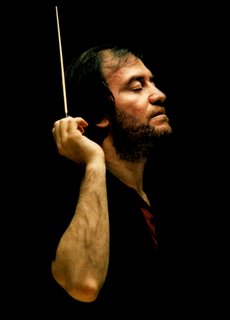 Performing the Verdi Requiem in the Opera House – which is where the Kirov Orchestra under Valery Gergiev played on Friday night – is a musical smirk (even if there was also a more practical reason behind that choice of venue: next door played Midori), given that it already has the reputation of being a “sacred opera.” It does so, because of its highly dramatic, even bombastic nature and the demands it makes on the singers. Verdi doing what he did best, such an outcome should not have been surprising.
Performing the Verdi Requiem in the Opera House – which is where the Kirov Orchestra under Valery Gergiev played on Friday night – is a musical smirk (even if there was also a more practical reason behind that choice of venue: next door played Midori), given that it already has the reputation of being a “sacred opera.” It does so, because of its highly dramatic, even bombastic nature and the demands it makes on the singers. Verdi doing what he did best, such an outcome should not have been surprising.There are now many hundreds of pages written in the attempt to free the Verdi Requiem from that early and allegedly cheap pun (coined by none other than Hans von Bülow) that some see a stigma sticking stubbornly to the work. Leave it to Gergiev and his band to obliterate any and all such efforts with a performance like the one conducted at the Kennedy Center. With brilliant support from his four soloists – as even a cast as that work could reasonably expect live – Gergiev delivered a performance of proportions such as I have not heard at the Kennedy Center (or anywhere else, for that matter) in a long, long time. The NSO’s performance last year – which didn’t impress me then, either – was a malnourished urban pussy next to Gergiev’s Liger. The orchestra may not have known quite what to do with the oddly spiritual sound world of Wagner’s Bühnenweihfestspiel (too religious?) – but this language they could believe in and respond to with their best and most dedicated playing all week. Every nervous hand-flicker of Gergiev’s was responded to, their trademark sloppiness all but gone. The timpani attacks in the Dies irae and again the Tuba mirum were ripping through the Opera House with intimidating force in an acoustic that revealed itself as not only superior to the Concert Hall’s but altogether good.
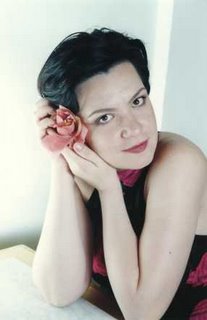 The soloists make or break a performance of the Requiem. Whether they are up to the challenge (and a challenge it is) is established right off the bat as Verdi has them all ‘present themselves’ in the Kyrie, right after the Requiem aeternam in the order of tenor, bass, soprano, mezzo soprano. Daniil Shtoda was first with the fiendishly difficult tenor part, and he kept the portamento within reason and proved honey-voiced and good. The voice could have been a bit more open or forceful, but it sounded fine by all accounts. If he was the weakest link in the soloist chain, it was a strong chain. Ildar Abdrazakov, in a slightly more comfortable, easier range, upped the ante a bit further... very good, indeed. An absolute strong point amid many strong points in the whole performance, solid and reliable like a rock, supple and with a beautiful tone. Olga Kondina – a dark silver snow-queen next to her younger colleague’s black penitential dress – was clean, clear, flawless. Her voice rang, she didn’t narrow on the high notes (especially important toward the end) and performed with an admirable mix of pure skill and experience. And then Belarussian Ekaterina Semenchuk opened her mouth to a low growl that had your blood freeze. An animal of the kind that immediately said: “Kundry.” Where were you, last Tuesday, when we needed you?
The soloists make or break a performance of the Requiem. Whether they are up to the challenge (and a challenge it is) is established right off the bat as Verdi has them all ‘present themselves’ in the Kyrie, right after the Requiem aeternam in the order of tenor, bass, soprano, mezzo soprano. Daniil Shtoda was first with the fiendishly difficult tenor part, and he kept the portamento within reason and proved honey-voiced and good. The voice could have been a bit more open or forceful, but it sounded fine by all accounts. If he was the weakest link in the soloist chain, it was a strong chain. Ildar Abdrazakov, in a slightly more comfortable, easier range, upped the ante a bit further... very good, indeed. An absolute strong point amid many strong points in the whole performance, solid and reliable like a rock, supple and with a beautiful tone. Olga Kondina – a dark silver snow-queen next to her younger colleague’s black penitential dress – was clean, clear, flawless. Her voice rang, she didn’t narrow on the high notes (especially important toward the end) and performed with an admirable mix of pure skill and experience. And then Belarussian Ekaterina Semenchuk opened her mouth to a low growl that had your blood freeze. An animal of the kind that immediately said: “Kundry.” Where were you, last Tuesday, when we needed you?Philip Kennicott, The Kirov Delivers a Requiem Full of Life (Washington Post, February 25) Tim Smith, Kirov Opera presents a stirring version of Verdi's 'Requiem' (Baltimore Sun, February 28) |
What. A. Voice! Low notes like I’ve not heard hurled at me since Waltraud Meier; nor sung like that since Anna Larsson. A spine in her voice, a fierce brilliance, unfailing confidence, and an unfailing sound: beautiful, tasteful, note perfect; if anything a little too subtle at the beginning of the Agnus Dei. It had a quality that was so immediately outstanding that it wanted to make me shout “Brava” mid-Liber Scriptus, blow kisses at the sounds that swooshed by my ears. Her lower register easily challenged Daniil Shotda’s higher. You couldn’t have foreseen such a performance by her CV as of yet, but it should be easy to project her future career based on it.
Take that and a choir that – a slightly ‘sticky’ beginning apart – performed as well as one might expect from this crack ensemble and the elements combined for a lavish splendor fit for no other venue than an opera house. (Which itself is, of course, the successful combination of arts temple and bordello.) A Requiem is supposed to soothe and appease the heavens on behalf of the deceased: Gergiev unrepentantly raised hell. Even the searing soft moments were devilishly good, a tail of sulphur flames never far from his frock. Let him be the most overrated conductor of our times, in the hour and-a-half of the Verdi Requiem he redeemed himself from all past and future musical sins, as far as I am concerned. Bravi!
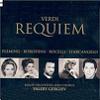 Gergiev / Fleming, Borodina, Bocelli, D'Arcangelo |  Giulini / Schwarzkopf, Ludwig, Gedda, Ghiaurov | 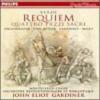 Gardiner / Orgonasova, von Otter, Canonici, Miles | 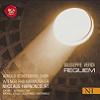 Harnoncourt / Mei, Fink, Schade, D'Arcangelo |
Gergiev has a recording out with the Requiem. Resist the urge to buy it, though. While the heft and thunder and glory (which I hoped to gain when I bought it a few years ago) is more or less present in the orchestra, it’s hopelessly ruined by Andrea Bocelli, who turns in one of his worst, most egregious performances. Step on a cat’s tail and you’ll likely get a better opening “Kyrie.” The rest of the starry cast (pre-mannerism Fleming, Borodina, D’Arcangelo) is good but can’t make up for the sonic crimes committed on this recording. Gardiner has the most impressive chorus and incredibly deft touches; Giulini a feel for theater and stupendous soloists (Schwarzkopf – Ludwig – Gedda – Ghiaurov); his recording on EMI is rightly a classic. Harnoncourt’s is the least operatic, the voices unmannered (Michael Schade very open sounding, but stretched after a while, D’Arcangelo brooding but not very deep, Fink with unusual affectation). The violins come through in astounding detail, nuances can be heard - in part due to glacial tempi - that are quite revealing. My current choice – although that’s in good part because of my personal dislike of portamento. Although impressive, it's quite a different kettle of fish than the type of performance Gergiev gave.

